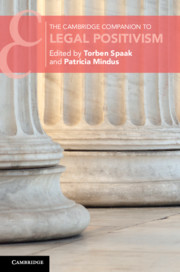Book contents
- The Cambridge Companion to Legal Positivism
- Cambridge Companions to Law
- The Cambridge Companion to Legal Positivism
- Copyright page
- Contents
- Figures
- Contributors
- Acknowledgements
- 1 Introduction
- Part I Fundamentals
- Part II History
- 5 The German Tradition of Legal Positivism
- 6 The French Tradition of Legal Positivism
- 7 The Italian Tradition of Legal Positivism
- 8 The British Tradition of Legal Positivism
- Part III Central Figures
- Part IV Main Tenets
- Part V Normativity and Values
- Part VI Critique
- Index
- References
5 - The German Tradition of Legal Positivism
from Part II - History
Published online by Cambridge University Press: 21 January 2021
- The Cambridge Companion to Legal Positivism
- Cambridge Companions to Law
- The Cambridge Companion to Legal Positivism
- Copyright page
- Contents
- Figures
- Contributors
- Acknowledgements
- 1 Introduction
- Part I Fundamentals
- Part II History
- 5 The German Tradition of Legal Positivism
- 6 The French Tradition of Legal Positivism
- 7 The Italian Tradition of Legal Positivism
- 8 The British Tradition of Legal Positivism
- Part III Central Figures
- Part IV Main Tenets
- Part V Normativity and Values
- Part VI Critique
- Index
- References
Summary
Kirste discusses legal scholars who were active in the nineteenth and twentieth centuries, identifying four main types of German legal positivism – jurisprudential, sociological, naturalistic, and statutory positivism – and a fifth type that he calls the general theory of law. His idea is that these theorists were legal positivists because they shared an epistemological aim, namely, establishing legal science as a science in its own right, independent of both the natural and the social sciences, and because they held that the only law is positive law in the sense of enacted norms or customary norms. He considers the theories of Hans Kelsen and Gustav Radbruch as examples of legal positivism. He points out that legal positivism lost its dominance in the wake of the post-World War II revival of natural law theory but soon reasserted its influence through the likes of Ota Weinberger, Niklas Luhmann, and Norbert Hoerster. He also notes that, since the late 1960s, authors such as Peter Koller and Ottfrid Höffe have focused on overcoming the gulf between natural law theory and legal positivism.
- Type
- Chapter
- Information
- The Cambridge Companion to Legal Positivism , pp. 105 - 132Publisher: Cambridge University PressPrint publication year: 2021
References
- 5
- Cited by

